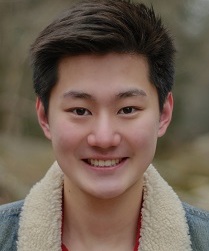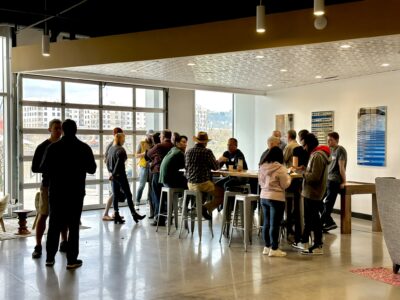Pittsburgh high schooler Steven Liu is imagining a greener future for consumers.
The senior at Shady Side Academy in Fox Chapel was named one of 40 finalists in the 2022 Regeneron Science Talent Search, earning recognition for his simulation models of using algae to develop a more sustainable and affordable biofuel. As one of the finalists in this year’s talent search — a collaboration between Regeneron Pharmaceuticals and Society for Science — Liu will receive $25,000, and have the chance to win up to $250,000 more at a weeklong competition with the other 39 finalists in early March.
Though Regeneron is a pharmaceutical biotech company, students in the talent search have projects ranging across all fields of science. Liu is the only finalist from Pittsburgh, and was selected from a pool of 1,800 entrants in the search. The selection process was based on “the originality and creativity of their scientific research, as well as their achievement and leadership both inside and outside of the classroom,” the org said.
Liu presented an earlier version of his project at the 2021 Pittsburgh Regional Science and Engineering Fair, where he earned first place in the senior division for chemistry and qualified for the Regeneron International Science and Engineering Fair. His project modeled green algae growth in a simulation that looked for the most cost-effective properties.
Liu told Technical.ly that the idea for his project initially came out of his participation in his high school’s independent study program:
All the semi trucks on the road and pickup trucks that you see transporting your goods and groceries, those will all be burning cleaner biodiesel in the future if my product reaches the market, while being less expensive.
“I grew algae in big jars, big glass jugs in the science building, and then I tried to make biodiesel from that,” he said.
Over that summer, Liu participated in the Research Science Institute, which is sponsored by MIT and the Center for Excellence in Education. While there, Liu took the data he had from his lab work and scaled up the production level using a computer simulation tool called SuperPro Designer, which allowed him to virtually alter components of the algae brewing process and see how that would affect production at a large scale. Then, he said, he can take the results of the simulation and insert them back into the physical world to test them and get even more feedback.
“It’s sort of this loop that grows stronger and stronger each time,” he said. “And then you create this amazing and pretty accurate model of what can happen.”
In doing that, Liu found that he could decrease the cost of algae-based biodiesel to 10% below the cost of conventional diesel while also being 77% less polluting. That’s a big breakthrough, he said, as current alternatives to regular diesel often rely on food crops — which would be better used as, well, food.
“That means that all the semi trucks on the road and pickup trucks that you see transporting your goods and groceries, those will all be burning cleaner biodiesel in the future if my product reaches the market, while being less expensive,” Liu said.
Looking ahead to the competition, Liu said he’s most excited not about the prospect of winning or losing for his work — now titled “Techno-Economic Assessment of a Cost and Quality-Based Algal Biodiesel Production Process” — but of getting to meet the other 39 finalists and learn more about their projects (something we’ve heard from other finalists, too).
“I’m not treating this as a competition actually. I’m treating this week as a great week to get to know more people who are truly incredible,” he said, noting that past winners of the talent search include the founders of Regeneron itself.
As for the $25,000 and any additional funding Liu wins, that will go toward college tuition. He’s already been accepted to Stanford University, though he’s keeping his options open until the commitment deadlines later this spring. His plans for his field of study shouldn’t be surprising: “I’m not entirely sure [about my major], but it’s definitely going to be a type of engineering.”
Sophie Burkholder is a 2021-2022 corps member for Report for America, an initiative of The Groundtruth Project that pairs young journalists with local newsrooms. This position is supported by the Heinz Endowments.Join the conversation!
Find news, events, jobs and people who share your interests on Technical.ly's open community Slack




